Welcome to How to Resist, a blueprint for resistance based on nonviolence, mutual aid, and community building for ordinary people who want to save democracy.
(Listen to the author’s letter by pressing the play button above.)
Dear Resisters,
It was a quiet week, as the country gets well into summer and all that goes with it. With a heavy defeat at our heels and another massive round of protests scheduled for July 17th (over 2,100+ planned events so far!!), it makes sense. But it does worry me some.
Because I pull ‘good news’ from published news articles, I’m working with a biased sample. I only see the things that are big enough or significant enough to make, at the least, the local news. Which means I see a lot of protests. But what worries me about protests is that protests are still solidly within the bounds of compliance. Protests operate within legitimate channels of democratic dissent and are, as we saw most recently with the huge public outcry against the Big Beautiful Bill, very easy to ignore by people in power.
Protests are wonderful for solidarity, building momentum, and establishing a historical record of dissent, but we need to be continually assessing if they are actually meeting our goals: are they disrupting, delaying, or collapsing systems of oppression and injustice?
Protests didn’t end segregation in the South, apartheid in South Africa, or colonial rule in India. Civil disobedience, economic resistance, refusal of compliance, international pressure, and legitimate political opposition did far more than any mass protest, no matter how big or how sustained. Even in the example of ending the American War in Vietnam, protests continued for over a decade before the high economic cost of the war and the realization that the US would never win against guerrilla tactics forced the US to admit defeat and withdraw troops.
I have my own particular ideas about resistance and how to effect change, and I’ve talked about those elsewhere in this substack. But this week, I’d like to hand the mic to another voice, one that doesn’t quite align with my own but is interesting, thought-provoking, and very much worth considering.
Below is a video from Tad Stoermer, professor of Public History at Johns Hopkins University and author of the forthcoming book, A Resistance History of the United States (Steerforth Press, 2026), who talks about resistance as the simple philosophy of saying, NO, about how protest is not a form of resistance, and how everyday resistance seeks makes the system work harder to exert power over us.
But what do you think? I’d love to hear your thoughts this week in the comments.
-M.
Support How to Resist
As a librarian writing in the service of democracy, I’m determined to keep How to Resist free to read and publicly available for everyone.
Producing How to Resist, however, is not free, and with fewer than 1% of readers supporting How to Resist with a paid subscription, we are still a long way from being fully funded.
If this work matters to you and you’re able to support it, please consider a paid subscription and help keep How to Resist going for as long as it’s needed.
Prefer a one-time contribution? You can donate at ko-fi.com/howtoresist
A Thousand Fires Everywhere
Canadian Protest Uses Art and Tomatoes to Show Dissent Over Trump’s Policies
At a cross-border rally in Windsor, Ontario, protesters gathered to symbolically reject President Trump’s rhetoric and policies by throwing tomatoes and timbits (doughnut holes) at a large portrait of Trump. The Elbows Up United Rally, held in coordination with a similar event in Detroit, expressed frustration over Trump’s tariff threats and antagonistic stance toward Canada. The peaceful, creative protest served as a moment of solidarity and resistance, uniting Canadians and Americans in opposition to divisive politics and in defense of international cooperation.1

Indianapolis Resists ICE Policies Through ‘Sick of ICE’ Day of Protest
In response to escalating immigration enforcement under the Trump administration, Indianapolis residents joined a national “Sick of ICE” protest by calling in sick to work and gathering for a community potluck and discussion. Organized by the Indianapolis Liberation Center, the event provided a space for people to share personal stories about immigration and strategize ways to support their immigrant neighbors. The protest also opposed Indiana Governor Mike Braun’s new law mandating police cooperation with ICE. Organizers emphasized that public pressure and community solidarity are essential to resisting harmful immigration policies and shaping a more just future.2
Phoenix Artist Uses Billboard to Protest Trump’s “Big, Beautiful Bill”
In Phoenix, artist Karen Fiorito unveiled a provocative billboard titled “Swamp King” to protest Trump’s recently signed “Big, Beautiful Bill,” which slashes social programs and boosts immigration enforcement. The 40-foot artwork satirizes Trump’s administration with imagery of corruption, militarism, and environmental decay. Fiorito’s piece critiques the bill’s impact on low-income families and highlights the dangers of authoritarian governance. Supported by the local arts community, the billboard continues a tradition of using public art in Phoenix as a form of political resistance and civic engagement.3
Philadelphia EPA Workers Protest 144 Suspensions Over Dissent Letter
Dozens of Environmental Protection Agency employees in Philadelphia rallied to protest the suspension of 144 colleagues nationwide who signed a letter criticizing the Trump administration’s handling of the agency. Organized by AFGE Local 3631, the demonstration condemned what union leaders called retaliation against protected employee speech. The letter, signed by over 600 EPA staff and thousands of citizens, raised concerns about political interference, disregard for science, and a culture of fear within the agency.4
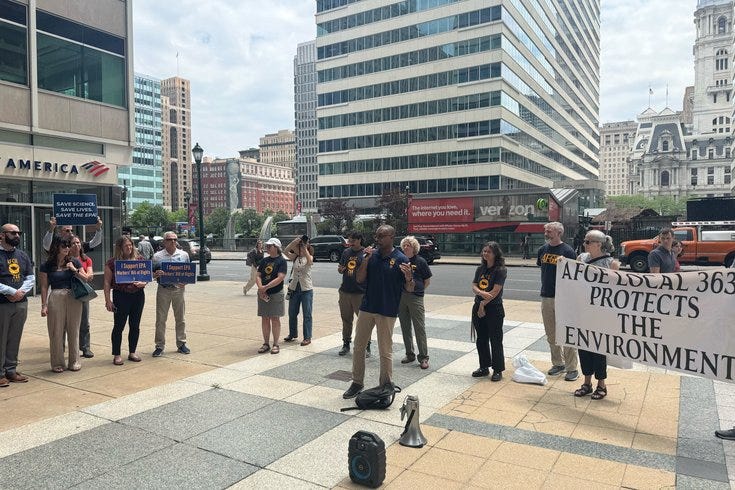
DC Advocacy Groups Protest Netanyahu Visit, Demand U.S. Accountability on Gaza
Ahead of Israeli Prime Minister Benjamin Netanyahu’s meeting with President Trump, several Washington, D.C.–based advocacy groups—including American Muslims for Palestine, CODEPINK, CAIR, and the U.S. Council of Muslim Organizations—held a press conference condemning the visit and calling for an end to U.S. support for Israel’s actions in Gaza. The groups demanded an immediate and permanent ceasefire, unrestricted humanitarian access, and an end to U.S. funding for entities implicated in civilian harm.5
Oregon Defends Clean Truck Rules Amid Trump-Era Rollback Efforts
Oregon has adopted permanent Clean Trucks Rules aimed at reducing emissions from medium- and heavy-duty vehicles, despite the Trump administration’s revocation of California’s Clean Air Act waivers that underpin such state-level standards. In response, Oregon joined a multi-state lawsuit challenging the federal rollback. While enforcement of the rules is delayed to give manufacturers time to adapt, the move signals Oregon’s commitment to climate action and clean transportation.6
Kentuckians Hold Silent “Mourning Procession” to Protest Trump’s Cuts to Social Programs
In Bowling Green, Kentucky, members of SOKY Indivisible, local Democrats, and community allies held a silent march to protest President Trump’s “Big Beautiful Bill,” which slashes funding for Medicaid, SNAP, and other essential programs. The group walked from First Christian Church to Pioneer Cemetery in a symbolic “mourning procession,” expressing grief over the bill’s impact on vulnerable populations. The action reflects growing grassroots resistance in conservative regions, where residents are organizing to defend social safety nets and challenge federal policies they view as harmful to their communities.7


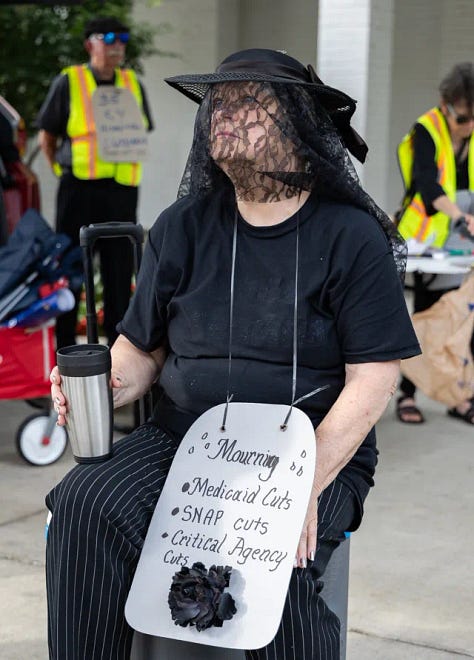
California Teens Protest Closure of Trans Youth Care Center Under Trump Administration
Trans teens in Los Angeles are protesting the Trump administration’s role in the upcoming closure of the Centre for Transyouth Health and Development at Children’s Hospital Los Angeles, the largest public provider of gender-affirming care for minors. The hospital cited federal funding threats, executive orders, and policy shifts as reasons for the shutdown, which follows a Supreme Court decision upholding a ban on such care in Tennessee. Youth and families say the closure is part of a broader effort to restrict trans rights, and they are demanding continued access to essential, life-affirming healthcare.8
Newark Activists Rally Against Trump’s “Big Beautiful Bill” and Its Impact on Communities
Advocacy groups in Newark, including the Ironbound Community Corporation and the People’s Organization for Progress, held a protest outside the Rodino Federal Building to oppose President Trump’s “Big Beautiful Bill.” Signed into law on Independence Day, the bill extends Trump-era tax cuts while slashing funding for healthcare, food assistance, and housing. Activists condemned the legislation as harmful to low-income and immigrant communities, calling it a gift to the wealthy at the expense of the social safety net.9
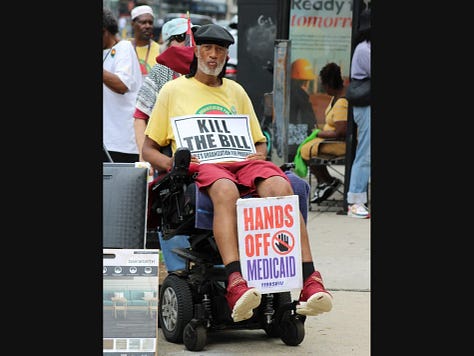


Fighting Back in the Courts
Environmental Groups Sue to Halt Border Wall Threatening Wildlife in Arizona
Two environmental organizations, the Center for Biological Diversity and Conservation CATalyst, have filed a lawsuit against the Trump administration to stop construction of a 30-foot border wall in Arizona’s San Rafael Valley. The administration waived 34 environmental laws to fast-track the project, which conservationists argue would devastate critical wildlife corridors for endangered species like jaguars and ocelots. The lawsuit challenges the legality of bypassing protections such as the Endangered Species Act and highlights the broader ecological and cultural harm posed by militarizing one of North America’s most biodiverse regions.10
Democrats Challenge Trump’s Use of Emergency Powers to Impose Tariffs
Nearly 200 Democratic lawmakers have filed a legal brief supporting a lawsuit against the Trump administration’s use of emergency powers under the International Emergency Economic Powers Act (IEEPA) to impose tariffs. Led by Sen. Jeanne Shaheen (D-NH), the brief argues that Trump’s actions represent an unlawful overreach that has caused economic harm to families and small businesses. The lawmakers assert that IEEPA does not authorize tariff imposition and warn that bypassing congressional safeguards undermines trade stability. The case, now under appeal, is part of broader efforts to rein in executive overreach and defend legislative authority over trade policy.11
Medical Associations Sue Trump Administration Over Vaccine Rollbacks
Seven major U.S. medical organizations, including the American Academy of Pediatrics and the Infectious Diseases Society of America, have filed a lawsuit against the Trump administration and Health Secretary Robert F. Kennedy Jr. for restricting access to COVID-19 vaccines and undermining public trust in immunizations. The suit challenges Kennedy’s decision to remove COVID-19 vaccines from the CDC’s recommended schedule for pregnant people and healthy children, a move experts say lacks scientific basis and endangers public health. Plaintiffs argue the changes were arbitrary and threaten decades of progress in vaccine confidence and disease prevention.12
Southern California Cities Expand Legal Fight Against Trump’s Immigration Raids
Los Angeles County and eight Southern California cities have joined a lawsuit against the Trump administration, challenging recent immigration raids as unconstitutional. The suit, originally filed by civil rights groups, accuses federal agents of racial profiling, arrests without warrants, and using militarized tactics that resemble kidnappings. Local leaders, including LA Mayor Karen Bass and Pasadena Mayor Victor Gordo, condemned the raids for threatening public safety and violating civil liberties. The legal action targets Homeland Security Secretary Kristi Noem and other officials, signaling a growing regional resistance to aggressive immigration enforcement.13 14
Iranian Green Card Applicants Sue Trump Administration Over Travel Ban and Delays
Fifty-eight Iranian professionals, including researchers and engineers, have filed a lawsuit against the Trump administration, alleging that a new travel ban has unlawfully stalled their green card applications despite prior national interest determinations. The suit, Ariani v. Blinken, argues that the administration’s failure to grant any exceptions under the ban effectively creates a blanket denial, violating immigration law. Represented by Red Eagle Law, the plaintiffs seek judicial intervention to compel application processing. This case adds to a growing legal resistance against Trump-era immigration policies that critics say undermine due process and U.S. innovation.15
Teacher Unions Sue Trump Over Columbia University Funding Cuts Tied to Campus Protests
Teacher unions representing Columbia University faculty have filed a lawsuit against the Trump administration for cutting $400 million in research funding, alleging the move violates the First Amendment and congressional spending authority. The cuts followed student protests against Israel’s actions in Gaza, which prompted the administration to pressure Columbia into adopting stricter protest policies. The lawsuit, led by the American Association of University Professors and the American Federation of Teachers, argues the funding cuts are a coercive tactic to suppress dissent and impose government control over academic freedom.16
Trial Begins Over Trump-Era Deportations Targeting Pro-Palestinian Campus Activists
A rare federal trial has begun in Boston challenging the Trump administration’s alleged policy of deporting international students and faculty for pro-Palestinian advocacy. The lawsuit, brought by academic associations including the AAUP and the Middle East Studies Association, argues that visa revocations and arrests following Trump’s executive orders violate First Amendment protections. Plaintiffs testified that fear of retaliation has chilled academic freedom and speech. The administration denies any ideological deportation policy, framing its actions as lawful immigration enforcement. The outcome could set a precedent for protecting political expression on U.S. campuses.17 18

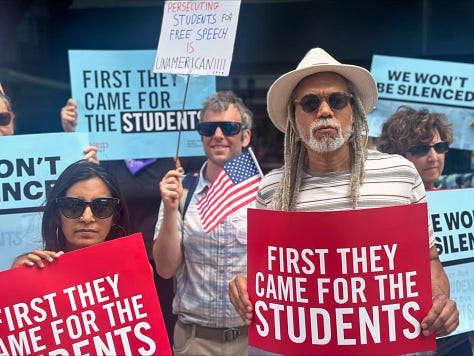
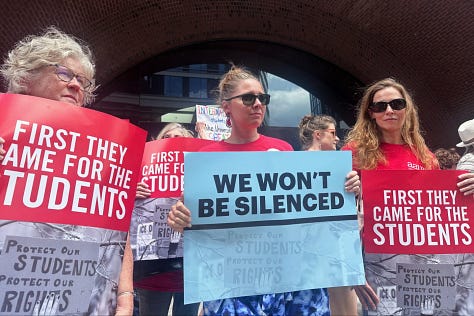
Judge Allows Legal Challenge to Trump-Era Deportation of Salvadoran Man to Proceed
A federal judge in Maryland has ruled that Kilmar Abrego’s lawsuit challenging his wrongful deportation to El Salvador can move forward, despite his recent return to the U.S. to face criminal charges. Abrego, who was deported in violation of a 2019 court order protecting him from persecution, is now at risk of being deported again. Judge Paula Xinis criticized the Trump administration’s handling of the case and ordered officials to clarify their plans. The ruling keeps alive a legal effort to hold the administration accountable for violating due process and immigration protections.19
Judge Blocks Trump’s Birthright Citizenship Order Using Class Action Exception
A federal judge in New Hampshire has blocked the Trump administration’s executive order denying birthright citizenship to children born in the U.S. to non-citizen parents, citing the risk of “irreparable harm.” Despite a recent Supreme Court ruling limiting nationwide injunctions, Judge Joseph Laplante used a class action exception to extend protection to all affected children. The ruling follows legal challenges from immigrant rights groups and Democratic-led states, who argue the order violates the 14th Amendment. The decision marks a significant legal pushback against Trump’s attempt to redefine citizenship through executive action.20
Watchdog Sues DOJ for Records on Trump Judicial Nominee Emil Bove Amid Misconduct Allegations
American Oversight has filed a lawsuit against the Department of Justice seeking records related to Emil Bove, a Trump judicial nominee accused of serious misconduct. The suit follows whistleblower claims that Bove, a top DOJ official and Trump’s former defense attorney, instructed subordinates to defy court orders and mislead judges, including in deportation cases and the dismissal of charges against NYC Mayor Eric Adams. The watchdog group is demanding transparency before Bove’s lifetime appointment to the federal bench is considered, citing concerns over abuse of power and political interference in justice.21
Pro-Palestinian Protest Leader Sues Trump Administration Over Detention
Mahmoud Khalil, a prominent leader of pro-Palestinian campus protests and a legal U.S. resident, has filed a $20 million lawsuit against the Trump administration for his arrest and 104-day detention. Backed by the Center for Constitutional Rights, Khalil alleges his detention was politically motivated retaliation for his activism, causing emotional trauma and economic harm. The lawsuit follows his release by court order and highlights broader concerns about the administration’s crackdown on dissent, particularly targeting student activists and immigrants critical of U.S. foreign policy. Khalil calls the suit a step toward accountability.22 23

Want more from How to Resist?
Check out these series:
Take Action: Mutual aid and community-building ideas you can try today
Tools of Resistance: Tactics of nonviolent resistance, past and present
Better Political Conversations: Strategies for engaging across divides without compromising your values or your relationships
Good News from the Resistance: Sunday morning news roundup of good news
Support How to Resist
As a librarian writing in the service of democracy, I’m determined to keep How to Resist free to read and publicly available for everyone.
Producing How to Resist, however, is not free, and with fewer than 1% of readers supporting How to Resist with a paid subscription, we are still a long way from being fully funded.
If this work matters to you and you’re able to support it, please consider a paid subscription and help keep How to Resist going for as long as it’s needed.
Prefer a one-time contribution? You can donate at ko-fi.com/howtoresist



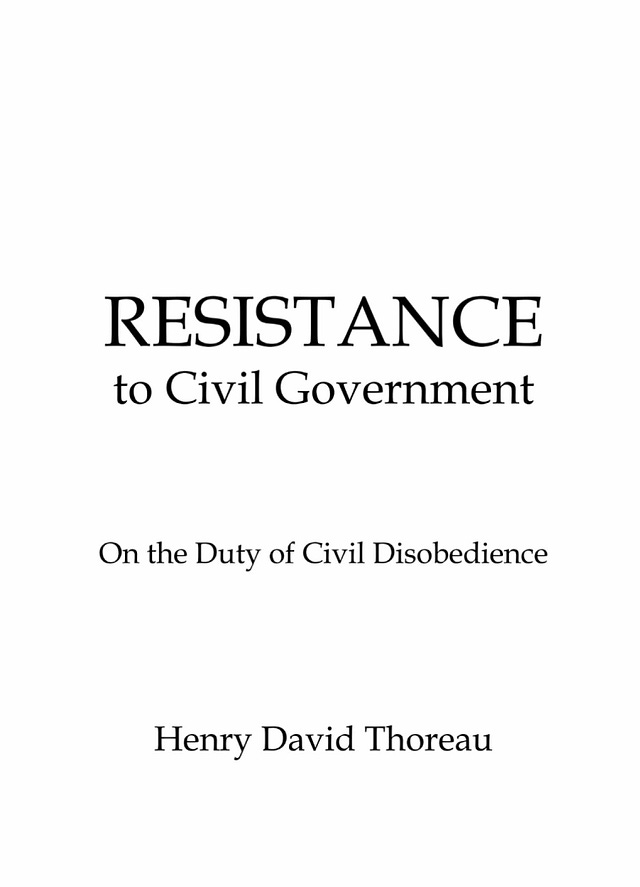



This is the kind of roundup that should be taped to the fridge of every demoralized dreamer and halfway-burned-out activist. Yes, protests are vital for solidarity and visibility—but as you said, they’re not the whole recipe. Resistance isn’t theater. It’s pressure. It’s refusal. It’s friction that costs the system something.
Tad Stoermer’s point lands hard: real resistance doesn’t beg for dignity—it denies cooperation with the machine that steals it. From tomatoes in Ontario to courtrooms in Boston, from teen organizers in LA to EPA workers in Philly—this is what it looks like when people stop asking for change and start being the refusal.
We don’t need everyone to be loud. But we do need everyone to withdraw their consent in some way. Even quietly. Even daily.
Grateful for this space and your relentless curation of hope with teeth. 🖤🔥